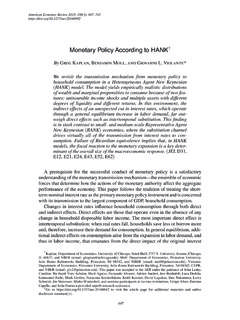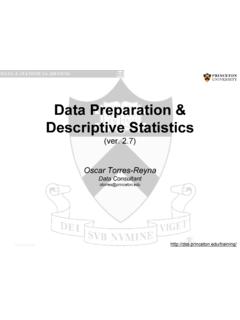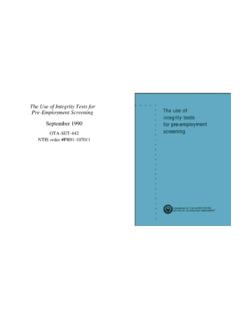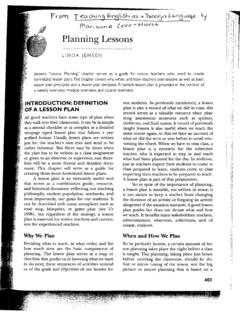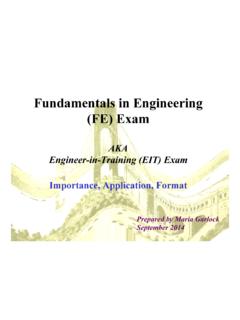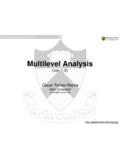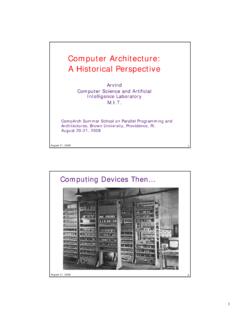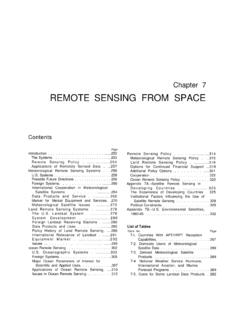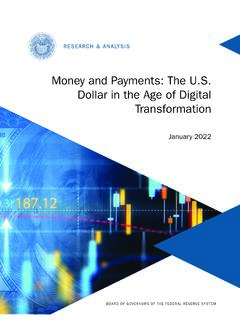Transcription of The Fundamental Principles of Financial Regulation
1 The Fundamental Principles ofFinancial RegulationGeneva Reports on the World Economy 07/05/2009 16:48 Page iInternational Center for monetary and Banking Studies (ICMB)International Center for monetary and Banking Studies 11 A Avenue de la Paix1202 GenevaSwitzerlandTel (41 22) 734 9548 Fax (41 22) 733 3853 Website: June 2009 International Center for monetary and Banking StudiesCentre for Economic policy Research (CEPR)Centre for Economic policy Research53-56 Great Sutton StreetLondon EC1V 0 DGUKTel: +44 (0)20 7183 8801 Fax: +44 (0)20 7183 8820 Email: Library Cataloguing in Publication DataA catalogue record for this book is available from the British LibraryISBN: 07/05/2009 16:48 Page iiThe Fundamental Principles ofFinancial RegulationGeneva Reports on the World Economy 11 Markus BrunnermeierPrinceton University and CEPRA ndrew Crocket JPMorgan Chase Charles GoodhartLondon School of EconomicsAvinash D.
2 PersaudChairman. Intelligence Capital LimitedHyun ShinPrinceton University and CEPRICMBINTERNATIONALCENTERFOR MONETARYAND BANKING STUDIESCIMBCENTRE INTERNATIONALD ETUDES MONETAIRESET 07/05/2009 16:48 Page iiiInternational Center for monetary and Banking Studies (ICMB)The International Center for monetary and Banking Studies was created in 1973 as an inde-pendent, non-profit foundation. It is associated with Geneva s Graduate Institute ofInternational Studies. Its aim is to foster exchange of views between the Financial sector, cen-tral banks and academics on issues of common interest. It is financed through grants frombanks, Financial institutions and central Center sponsors international conferences, public lectures, original research and publi-cations.
3 It has earned a solid reputation in the Swiss and international banking communitywhere it is known for its contribution to bridging the gap between theory and practice inthe field of international banking and finance. In association with CEPR, the Center launched a new series of Geneva Reports on the WorldEconomyin 1999. The eight subsequent volumes have attracted considerable interest amongpractitioners, policy -makers and scholars working on the reform of international financialarchitecture. The ICMB is non-partisan and does not take any view on policy . Its publications, includingthe present report, reflect the opinions of the authors, not of ICMB or of any of its spon-soring of the Foundation BoardTommaso Padoa-Schioppa Director Charles WyploszCentre for Economic policy Research (CEPR)The Centre for Economic policy Research is a network of over 700 Research Fellows andAffiliates, based primarily in European universities.
4 The Centre coordinates the researchactivities of its Fellows and Affiliates and communicates the results to the public and privatesectors. CEPR is an entrepreneur, developing research initiatives with the producers, con-sumers and sponsors of research. Established in 1983, CEPR is a European economicsresearch organization with uniquely wide-ranging scope and is a registered educational charity. Institutional (core) finance for the Centre is pro-vided by the European Central Bank, the Bank of England, 33 other national central banks,36 companies and the European Commission. None of these organizations gives priorreview to the Centre s publications, nor do they necessarily endorse the views Centre is pluralist and non-partisan, bringing economic research to bear on the analy-sis of medium- and long-run policy questions.
5 CEPR research may include views on policy ,but the Executive Committee of the Centre does not give prior review to its publications,and the Centre takes no institutional policy positions. The opinions expressed in this reportare those of the authors and not those of the Centre for Economic policy of the BoardGuillermo de la DehesaPresidentRichard PortesChief Executive OfficerStephen YeoResearch DirectorMathias DewatripontPolicy DirectorRichard 07/05/2009 16:48 Page ivAbout the AuthorsMarkus K. Brunnermeieris the Edwards S. Sanford Professor at PrincetonUniversity. He is a faculty member of the Department of Economics and affiliatedwith Princeton s Bendheim Center for Finance and the International EconomicsSection.
6 He is also a research associate at CEPR, NBER and CESifo, and an academicconsultant to the Federal Reserve Bank of New York. He was awarded his bythe London School of Economics (LSE), where he was also affiliated with itsFinancial Markets Group. He is a Sloan Research Fellow, and recipient of theGerman Bern cer Prize granted for outstanding contributions in the fields ofmacroeconomics and finance. He is primarily interested in studying Financial crises, bubbles and significantmispricings due to institutional frictions, strategic considerations, and behavioraltrading. His research also explains why liquidity dries up when it is needed mostand has important implications for risk management and Financial Regulation .
7 Heis also an associate editor of the American Economic Review, Journal of EuropeanEconomic Association, Journal of Finance, Journal of Financial Intermediationand waspreviously on the editorial board of the Review of Financial Goodhart, CBE, FBA is a member of the Financial Markets Group at theLondon School of Economics, having previously, 1987-2005, been its DeputyDirector. Until his retirement in 2002, he had been the Norman Sosnow Professorof Banking and Finance at LSE since 1985. Before then, he had worked at the Bankof England for seventeen years as a monetary adviser, becoming a Chief Adviser in1980. In 1997 he was appointed one of the outside independent members of theBank of England's new monetary policy Committee until May 2000.
8 Earlier hehad taught at Cambridge and LSE. Besides numerous articles, he has written a couple of books on monetary his-tory; a graduate monetary textbook, Money, Information and Uncertainty(2nd ); two collections of papers on monetary policy , monetary Theory and Practice(1984) and The Central Bank and The Financial System(1995); and a number ofbooks and articles on Financial Stability, on which subject he was Adviser to theGovernor of the Bank of England, 2002-2004, and numerous other studies relat-ing to Financial markets and to monetary policy and history. Andrew Crockett is President of JPMorgan Chase International, and a member ofthe Executive Committee of JPMorgan Chase & Co.
9 Before joining JPMorganChase, Mr. Crockett had been General Manager (CEO) of the Bank 07/05/2009 16:48 Page vInternational Settlements ("The Central Banks' Bank"), serving two five-year the request of the G-7 Finance Ministers, he also served from 1999-2003 as thefirst Chairman of the Financial Stability Forum, a group of senior Financial offi-cials from the major economies that monitors the health of the InternationalFinancial System. Earlier in his career, Mr. Crockett had held senior positions atthe Bank of England and the International monetary Fund. Mr. Crockett has also served in the past as Chairman of Working Party 3 of theOECD, as Alternate Governor of the IMF for the United Kingdom, as a member ofthe monetary Committee of the European Union; and as a Trustee of theInternational Accounting Standards Committee Foundation.
10 He is currently amember of the Group of 30, Chairman of the Per Jacobsson Foundation, memberof the International Council of the China Banking Regulatory Commission, mem-ber of the International Council of the China Development Bank, Director of theInternational Centre for Leadership in Finance (Malaysia), and a trustee of theAmerican University of honours received by Mr. Crockett are Honorary LLD (University ofBirmingham) European Banker of the year (2000), and Knight Bachelor (UnitedKingdom, 2003). He is the author of several books on economic and Financial sub-jects, as well as numerous articles in scholarly Persaud s career spans finance, academia and policy advice.
